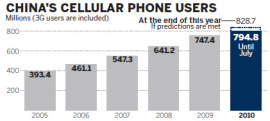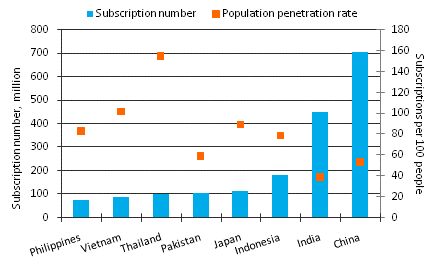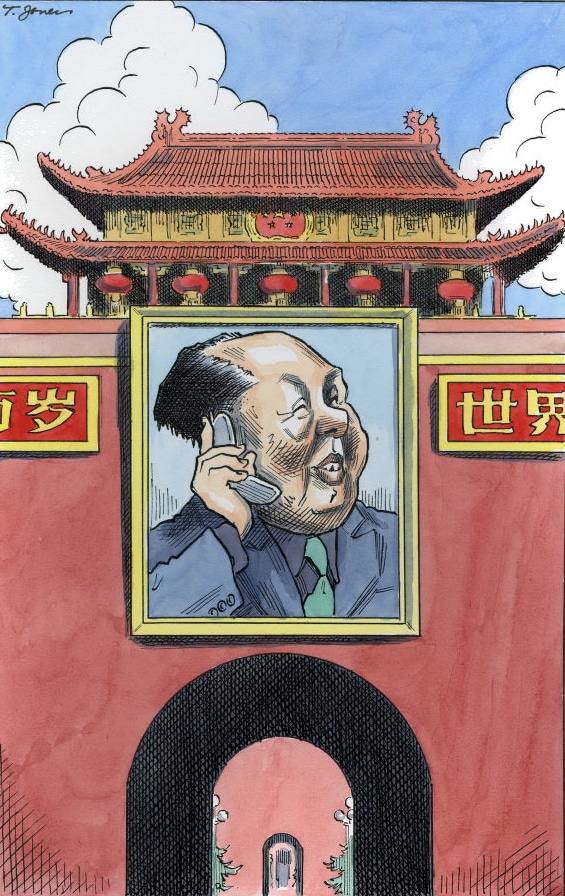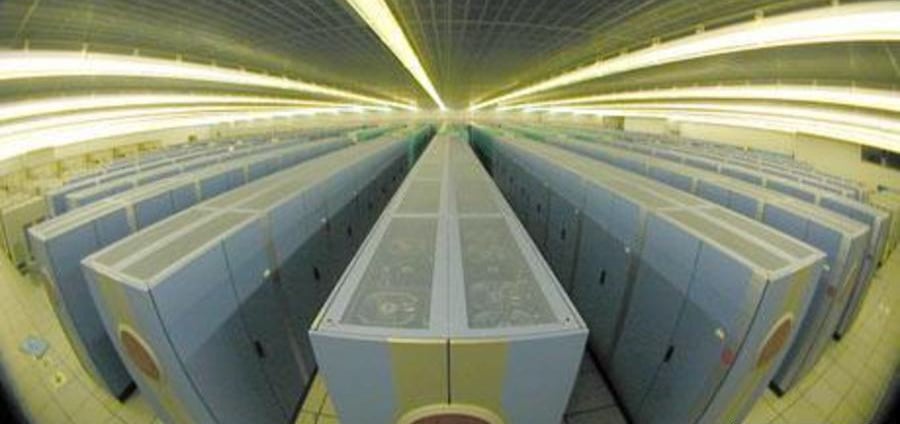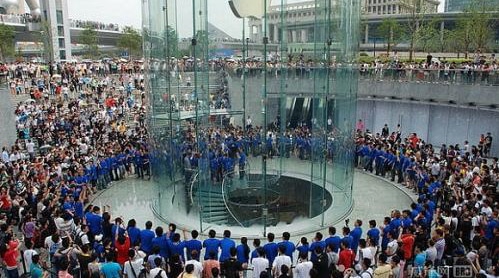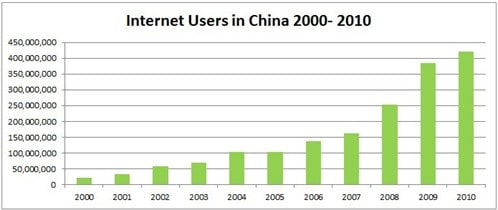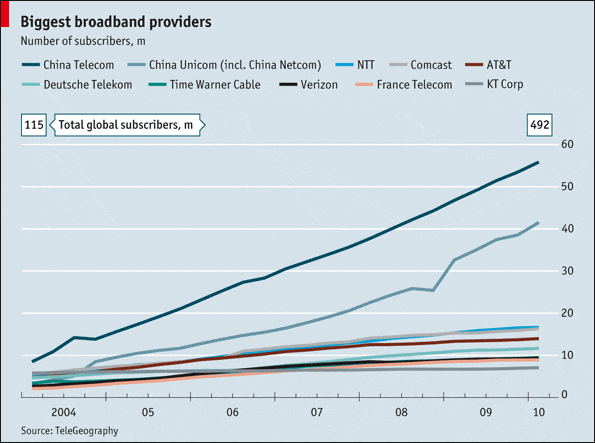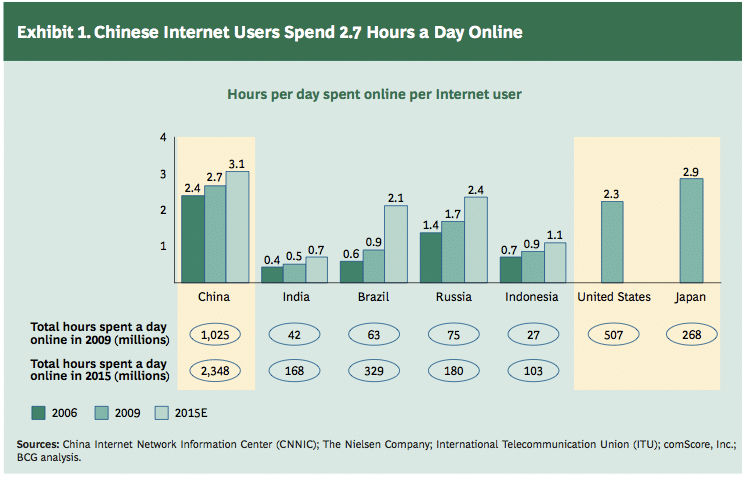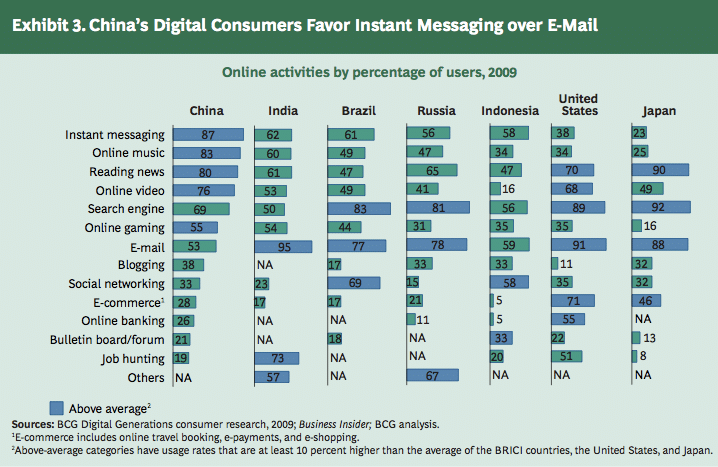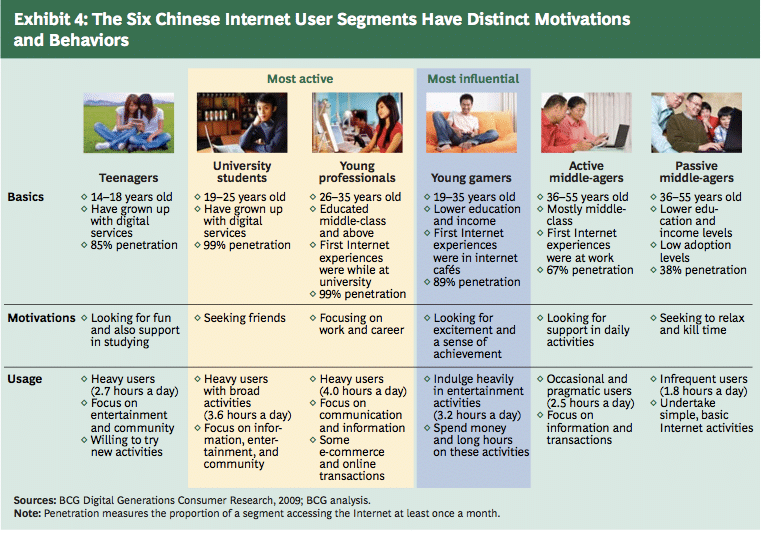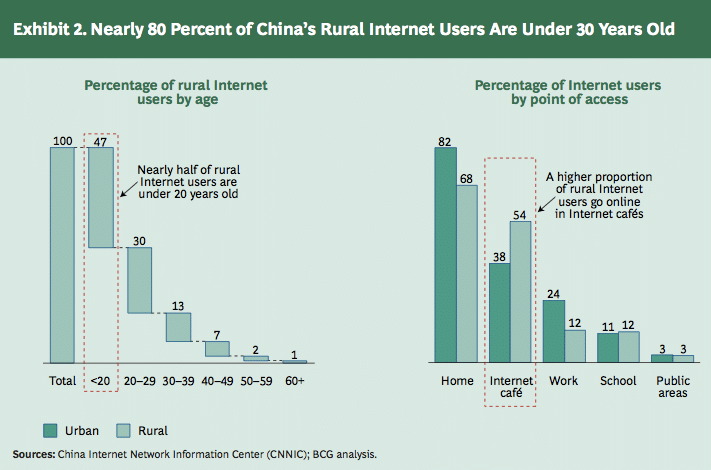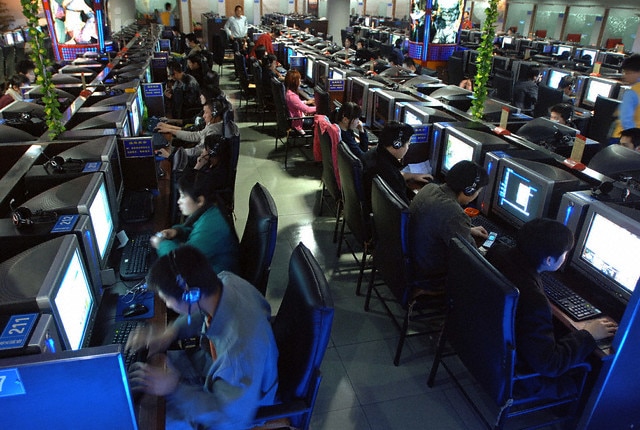Below you will find China Mike’s 100% verified, no B.S. facts about the Technology, Internet, & Media in China.
China facts: MOBILE PHONE PENETRATION RATE
China has the world’s largest mobile phone population (over 850 million active accounts in 2011).
[ Wikipedia “List of countries by number of mobile phones in use” ]
China’s mobile phone penetration rate is only about 53%–considerably lower than the global average of 67% in 2009.
[Euromonitor 2010 report “Regional Focus: Asia Pacific – the world’s largest mobile phone market” ]
China’s state-owned China Mobile is world’s biggest mobile phone operator, with 70% share of the domestic market.
[ The Guardian UK, January 11, 2010 ]
Mobile phone subscribers are now required to show identification when setting up a new account, including foreigners and visitors.
[ CNET News “China requires cell phone subscriber IDs” Sept. 1, 2010 ]
China censors its internet for all users within the country, although it’s possible to use a VPN in China to access blocked content.
China facts: COMPUTERS & ELECTRONICS
China now has the world’s fastest supercomputer, after taking the title from the U.S. in 2010. China’s Tianhe-1A is “a computing monster” with 262 terabytes of memory and is housed in 140 refrigerator-sized cabinets.
[ Wired Mag “China Beats U.S. For the World’s Fastest Supercomputer Title” Oct. 28, 2010 ]
China is the world’s leading electronics exporter. According to data from China’ s Ministry of Commerce, China exported US$933.4 billion worth of mechanical and electrical products in 2010.
[Ministry of Commerce; China Daily “China’s electronics exports top the world in 2010” Feb 24, 2011 ]
China will be the world’s largest computer market by 2013, according to the CEO of Acer, the world’s second-largest computer maker behind Hewlett-Packard.
[ Bloomberg News “Acer Says China to Be World’s Largest Computer Market” Nov. 30, 2010 ]
Only about 20% of China’s population owns a PC. However, many tens of millions more are able to access the Internet at Internet cafés, in workplaces, or through PCs that are shared by a household.
[ BCG report “China’s Digital Generations 2.0” May 2010 ]
INTERNET FACTS & PENETRATION RATES
China has the world’s largest Internet population—with over 450 million Chinese internet users as of 2010.
[ Wikipedia; AP “China’s Internet population rises to 457 million” Jan. 19, 2011 ]
By 2015, China’s Internet population is expected to reach more than 650 million…..however, that still would only represent less than 50% of China’s total population.
[ BCG report “China’s Digital Generations 2.0” May 2010 ]
By 2015, China’s Internet penetration rate is expected to jump from 29% (2010) to nearly 50%.
[ BCG report “China’s Digital Generations 2.0” May 2010 ]
By 2015, Internet penetration will reach almost 40% in China’s vast rural population.
[ BCG report “China’s Digital Generations 2.0” May 2010 ]
Today, only 16% of rural residents have access to household PCs, compared with 70% of residents in tier 1 cities such as Shanghai and Beijing.
[ BCG report “China’s Digital Generations 2.0” May 2010 ]
More than half of China’s rural Internet users go to Internet cafés to go online, compared with 38% of urban users.
[ BCG report “China’s Digital Generations 2.0” May 2010 ]
The Chinese government employs an estimated 30,000 workers as “Internet police” to monitor Internet traffic, as well as instant messaging services, text messages, and online chat rooms.
[ The Guardian UK “China’s secret internet police target critics with web of propaganda” June 14, 2005 ]
Facebook, Twitter, Youtube, and Wikipedia are blocked in China by the “Great Firewall of China.”
[Wikipedia “List of websites blocked in the People’s Republic of China” ]
China has the #1 and #2 largest broadband providers in the world. China Telecom and China Unicom together account for a fifth of all global broadband subscribers.
[ The Economist online “China Clicks” Aug. 10, 2010 ]
CHINA’S INTERNET OBSESSION
“The Chinese are obsessed with the Internet”, according to a McKinsey & Co. survey that found that Chinese people in China’s 60 largest cities spend around 70% of their leisure time on the Internet. Chinese people “use the Internet more for entertainment—playing online games, messaging, downloading music and movies, and shopping—than for work.”
[ McKinsey & Co. “China’s Internet obsession” March 2010 ]
China, as a country, spent more than 1 billion hours online per day in 2009….double the daily total in the United States. This figure is expected to grow to well over 2 billion hours per day by 2015.
[ BCG report “China’s Digital Generations 2.0” May 2010 ]
China’s digital consumers spend an average of 2.7 hours a day online (2009), which is 0.4 hours a day more than the average rate in the United States. It’s also the highest among all the “BRICI” countries (the major emerging markets including Brazil, Russia, India, and Indonesia).
[ BCG report “China’s Digital Generations 2.0” May 2010 ]
More than 50 percent of Chinese digital consumers use search engines and play games online.
[ BCG report “China’s Digital Generations 2.0” May 2010 ]
More than 80% of Chinese digital consumers use instant messaging (IM), read news online, and download/stream music via the Internet. Three-quarters of them also stream video.
[ BCG report “China’s Digital Generations 2.0” May 2010 ]
The Chinese prefer IM over email. “One of the most distinctive online habits among Chinese consumers is the tendency to prefer instant messaging (IM) over e-mail. For instance, 87 percent of Chinese digital consumers use the Internet for IM, compared with only 53 percent for e-mail.”
[ BCG report “China’s Digital Generations 2.0” May 2010 ]
Social-networking sites boomed in China among university students and young professionals in 2008. By 2009, Chinese Internet users of all backgrounds and age groups were active users (130 million total users of social-networking sites).
[ BCG report “China’s Digital Generations 2.0” May 2010 ]
qq.com—a popular social networking and instant messaging platform in China—has more than 480 million active IM accounts alone.
[ Wired Mag “Obsessed With the Internet: A Tale From China” Jan. 13, 2010]
China facts: ONLINE SHOPPING & ADVERTISING
Online shopping is taking off in China—“one of the most significant changes in online behavior in China since 2007 is the embrace of e-commerce”.
[ BCG report “China’s Digital Generations 2.0” May 2010]
The Chinese spend more time online and are more likely to buy goods online than people in any other large developing country, even richer ones, like Brazil and Russia.
[ BCG report “China’s Digital Generations 2.0” May 2010]
About 8% of China’s population shopped online in 2009…compared with just 3% in 2006. By 2012, e-commerce adoption is estimated to jump to 19%. [BCG report “China’s Digital Generations 2.0” May 2010]
Online advertising in China–which is taking share from magazines, newspapers, and TV—is growing fast. By 2012, it will hit a projected 20% of total advertising (up from 8% in 2008). By 2012, China’s online ad market is expected to reach $8.6 billion. [BCG report “China’s Digital Generations 2.0” May 2010]
China facts: YOUNG & ONLINE
The bulk of China’s digital consumption comes from those aged 35 and under, who make up 73% of China’s total online population and account for more than 80% of the total online hours in China.
[ BCG report “China’s Digital Generations 2.0” May 2010 ]
Chinese young professionals—representing 6% of Internet users in China— have an eye-popping 99% penetration. This group also has the heaviest Internet use—spending an average of 4.0 hours online per day.
[ BCG report “China’s Digital Generations 2.0” May 2010 ]
In rural China today, nearly half of all Internet users are under 20 years old. Nearly 80% are under 30.
[ BCG report “China’s Digital Generations 2.0” May 2010 ]
CHINA’S INTERNET ADDICTED YOUTH
China has an estimated 24 million youth who are addicted to the Internet, with almost half being “obsessed” with online games, according to the China Youth Association for Network Development. Chinese parents pay about US$3,000 total to send kids to Internet Addiction boot camps.
[ Wall Street Journal “Brief Escape From Internet-Addiction Boot Camp” June 9, 2010 ]
Click here for “Internet Boot Camp Jail Break” and more, in China facts: WEIRD & ODDBALL.
Young gamers–representing 21% of all Internet users—average 3.2 hours a day online, mainly playing online games and on instant messaging.
[ BCG report “China’s Digital Generations 2.0” May 2010 ]
A Chinese video-game addict dropped dead from stress and exhaustion after playing “Legend of Mir II” for 20 hours in an Internet cafe in Chengdu. Separately, around the same time, two secondary school students in Chongqing—exhausted after two days of online gaming—were killed by a train when they fell asleep on railroad tracks. In Tianjin, a 13-year-old—after a 36-hour session of World of Warcraft—leaped off the roof of his 24-story building, hoping to “join the heroes of the game”.
[ Wired Mag “Obsessed With the Internet: A Tale From China” Jan. 13, 2010; LA Times “China’s Newest Cultural Revolution Worries Elders” July 2004 ]
Similar “deprogramming centers” for Internet addicts have sprung up throughout Asia, from Thailand to South Korea to Vietnam.
[ Wired Mag “Obsessed With the Internet: A Tale From China” Jan. 13, 2010]
NEXT: China Facts: RICH, POOR & INEQUALITY >>
Return to Facts about China home page


